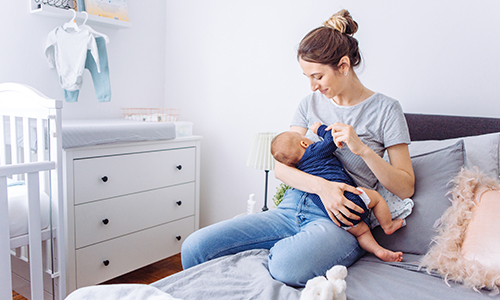Breastfeeding and giving your baby a pacifier between feeds has both advantages and disadvantages. Above all, it is important to trust your instincts and keep a close eye on the needs of your child. Apart from that, it's a good idea to find out as much as you can. We explain what you definitely need to bear in mind!
 |
When should you not give a pacifier?
It is generally recommended not to give your baby a pacifier before it can drink from the breast. Because of the pacifier, some babies do not always indicate when they are hungry. It can then be difficult to find a natural breastfeeding rhythm for the two of you. Moreover, frequent sucking on a pacifier can cause your baby to be too tired when you're ready to breastfeed. After a while, this can affect your milk production.
Combining breastfeeding and pacifier
All babies occasionally suffer from cramps, pain or stress. Gently sucking on a pacifier consoles them. But make sure that the teat you give is not longer than necessary, so that it doesn't interfere with your breastfeeding times (as we explained above). Does you baby have a high suckling need between the various feeding times? Then don't hesitate to give your little one a pacifier, but make sure you take it away as soon as they have calmed down enough.
Pacifier only when it's really needed
Many parents use a pacifier after a while as a replacement for breastfeeding, as it may make it easier for your little one to stop breastfeeding. But you need to make sure that pacifiers don't become a habit for your baby. Children who suck pacifiers for too long run much more risk of developing tooth, jaw and speech problems later on, compared to other children. That's why it is better to only use a pacifier to console the baby, or to make it easier for them to fall asleep.
Take your child's suckling need into account
Of course you know your child inside out, but some parents find it tricky to work out when their baby's suckling need is sufficiently reduced to stop giving them a pacifier. In any case, doctors have found that the suckling need begins to decrease when a baby is around four months old - although every child naturally develops at its own unique pace.